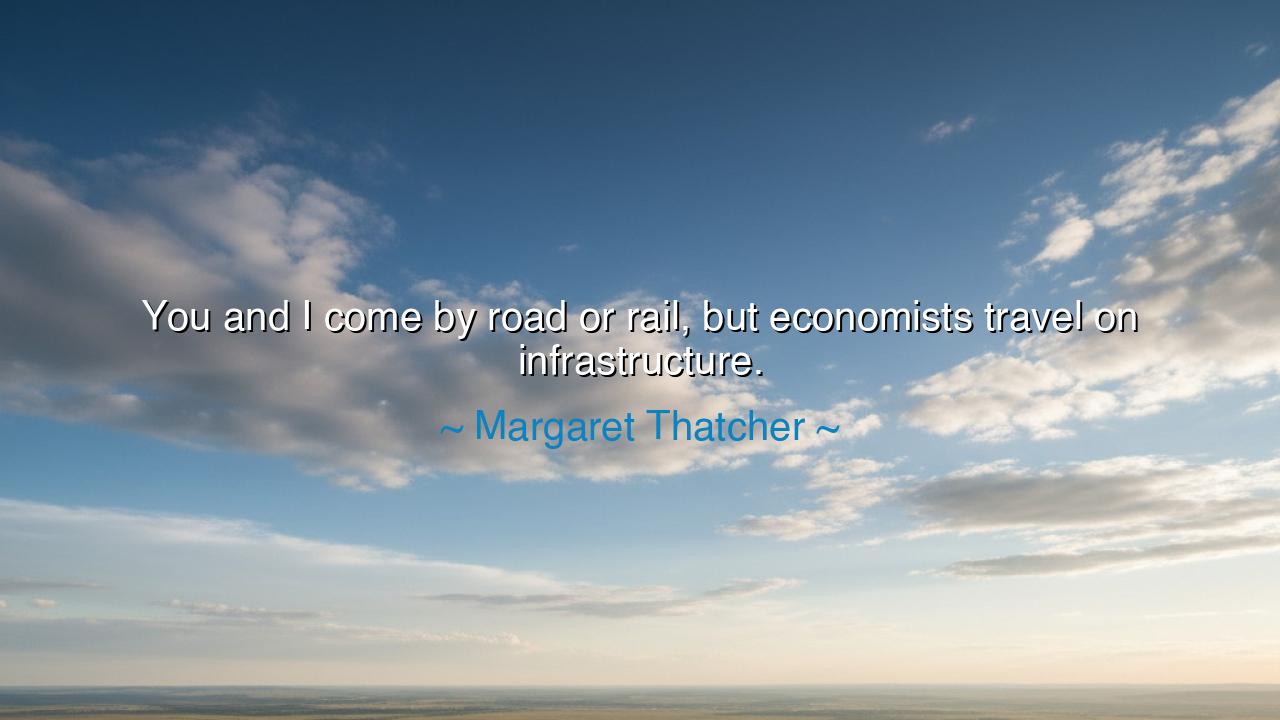
You and I come by road or rail, but economists travel on






Margaret Thatcher, with the clarity of one who saw the hidden engines of nations, once declared: “You and I come by road or rail, but economists travel on infrastructure.” Though the words seem plain, they hold a wisdom as deep as empire itself. For in this saying she reminds us that while ordinary people see the visible paths of daily life—the highways, the trains, the journeys of flesh and time—the true guardians of prosperity must see beneath these surfaces, into the foundations upon which all travel, trade, and growth depend.
The road and the rail are the symbols of the common journey, the visible arteries of society. But infrastructure is more than what the eye beholds—it is the silent skeleton of civilization. It is the bridges that do not fall, the pipes that bring water unseen, the wires that hum with light, the schools that shape young minds, the ports that carry goods across seas. Thatcher’s words reveal that the economist, the one who measures the health of nations, does not look merely at the car or the train, but at the network that makes them possible. To them, infrastructure is not background—it is destiny.
The ancients knew this truth. The greatness of Rome did not rest only in its armies, but in its roads, paved and straight, carrying legions, trade, and ideas across continents. The aqueducts, unseen by many, brought life to cities, making prosperity possible. When the infrastructure of Rome was strong, the empire thrived. When it crumbled, so too did the glory of Caesar and Senate. The lesson echoes in Thatcher’s words: without strong foundations, even the mightiest power falls into ruin.
History provides other testimony. In the 19th century, the building of railways in Britain and America unleashed new eras of wealth and unity. Towns once isolated became linked; goods once rare became common. But it was not the trains alone that mattered—it was the laying of track, the building of stations, the system beneath the spectacle. Economists, wise in their craft, saw that prosperity did not come from the passenger’s ticket, but from the strength of the iron lines beneath their feet.
Thatcher’s statement also carries a warning. The ordinary citizen may judge prosperity by the smoothness of their own road or the swiftness of their own rail, but the true test of a nation lies deeper. If the infrastructure is neglected—if bridges crack, if power grids falter, if schools decay—then decline has already begun, even if daily life seems unchanged. The wise ruler, like the wise economist, sees this and acts before collapse. For when the foundations crumble, it is too late to rebuild.
The meaning is therefore profound: while we may live upon the surface of society, we must remember the hidden structures that sustain it. Roads and rails may carry our bodies, but infrastructure carries our future. To ignore it is to gamble with destiny; to strengthen it is to secure generations yet unborn. Thatcher’s words are not only observation, but command: look deeper, think longer, invest in what lies beneath.
The lesson for us is clear. Do not be content with the visible comforts of the present. Ask instead: what supports them? In your community, your workplace, your nation, what is the infrastructure—the hidden system—that sustains all else? Tend to it, strengthen it, and never take it for granted. For without it, progress halts and life withers. The greatness of any people lies not in the polish of today, but in the hidden strength prepared for tomorrow.
Thus Margaret Thatcher’s words rise beyond economics into timeless truth: “You and I come by road or rail, but economists travel on infrastructure.” Let us all learn to think as those economists do: to see not only the journey, but the foundation of the journey; not only the surface, but the structure beneath. In this way, we may walk not only the roads of today, but build the paths of the future.






AAdministratorAdministrator
Welcome, honored guests. Please leave a comment, we will respond soon